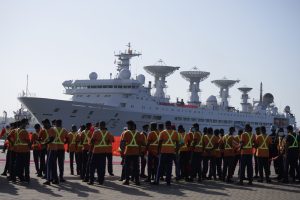Although the Chinese ship Yuan Wang 5 departed from Sri Lanka’s Hambantota Port on August 22, the controversy over its docking continues to roil the waters around the Indian Ocean island.
Last week, Chinese and Indian diplomats in Colombo engaged in a war of words over the vessel’s controversial visit to Sri Lanka.
A signed article by Chinese Ambassador to Sri Lanka Qi Zhenhong published in Sri Lanka Guardian on August 26 set off the Sino-Indian sparring. In the article, Qi claimed that China and Sri Lanka had together “resisted the rude and unreasonable interference from third parties” to block the docking of Yuan Wang 5 at the island.
The Yuan Wang 5 was to dock at Hambantota Port between August 11 and 17, ostensibly for “replenishment [of supplies], including fuel.” The Sri Lankan government had permitted this initially. However, following “concerns” raised by India – reports in the Indian media warned of the ship’s possible use by the Chinese for surveilling defense installations in southern India — Sri Lanka withdrew its approval for the ship’s berthing just a few days ahead of its arrival, and requested Beijing to defer the visit “until further consultations.”
High-level consultations between Chinese and Sri Lankan officials followed. These culminated in Sri Lanka permitting the Yuan Wang 5 to dock at Hambantota Port between August 16 and 22.
In his article, Qi slammed India for pressuring Sri Lanka to call off the Chinese ship visit. It is “always” making “various groundless excuses to bully Sri Lanka and trample on Sri Lanka’s sovereignty and independence repeatedly,” he said. He also pointed to a history of aggression from the island’s “northern neighbor.”
The Indian High Commission in Colombo clapped back immediately. In a series of tweets, it criticized Qi for “violation of basic diplomatic etiquette.” It blamed China’s “opaqueness and debt driven agendas” for Sri Lanka’s current economic crisis and went on to point out that “#SriLanka needs support, not unwanted pressure or unnecessary controversies to serve another country’s agenda,” a dig at China’s reluctance to help Sri Lanka come out of its economic crisis.
Unlike China which has provided Sri Lanka with little help to deal with the economic crisis, India has extended the island loans, lines of credit and humanitarian assistance worth $3.8 billion since early this year. This has helped New Delhi regain influence in Sri Lanka, mainly in the form of public goodwill.
However, as Sri Lankan decisions over the Yuan Wang 5’s docking at Hambantota Port indicated, Beijing’s grip over Colombo has not weakened.
The Sino-Indian face-off over the Yuan Wang 5 visit was a victory for China. After all, the Chinese ship was able to berth at Hambantota Port eventually, even if restrictions on its activity there that Sri Lanka reportedly imposed may have limited benefits from any snooping it may have hoped to engage in while docked at the port.
The Chinese did suffer a setback in the initial phases of the Yuan Wang 5 controversy, when Colombo withdrew its approval of the ship’s docking at the island. This riled the Chinese, who were “especially angry because approval was granted and then it was withdrawn,” Nikkei Asia quoted a Sri Lankan foreign ministry official as saying.
It was a loss of face for China. This was the second time in less than a year that Sri Lanka had slighted the Chinese, the first being in October last year when the Gotabaya Rajapaksa administration rejected 20,000 tons of organic fertilizer shipped by a Chinese company.
That tiny and bankrupt Sri Lanka, which owes China billions of dollars, dared to uninvite the Chinese ship would have been particularly galling to the Chinese. That it did so on nudging from India would have added insult to injury. A rising power, China could not be seen to be not responding to the slight.
At meetings in Beijing and Colombo, the Chinese adopted a tough stance. They reportedly warned their Sri Lankan counterparts that calling off the ship visit would impact their decisions on the restructuring of Sri Lankan loans — Sri Lanka owes China an estimated $1.5 to $2 billion in debt repayment this year – and ongoing bilateral talks relating to a $4 billion aid package and a free trade agreement.
Sri Lankan economists have pointed out that the country “can’t get out of this crisis without China.” This realization is likely to have prompted the Sri Lankans to heed the Chinese officials’ warnings and re-invite the Yuan Wang 5.
For China, docking at the Hambantota Port was important not for replenishment of supplies or even snooping on India. It was important to signal to India and the world that Beijing’s clout in Sri Lanka has not diminished and that China has interests and influence in the Indian Ocean, which it will exercise because it can.
The recent trading of barbs between Indian and Chinese diplomats in Colombo indicates that the Beijing-Delhi contest for influence in Sri Lanka has gained a fresh lease of life.
































